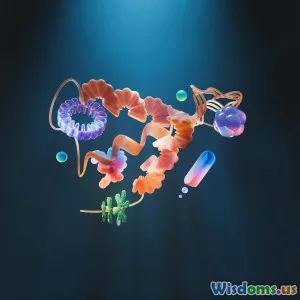
Exploring Myths: Lessons for Modern Life
6 min read Uncover how ancient myths provide valuable insights and lessons for modern living, bridging the gap between past and present. (0 Reviews)
Exploring Myths: Lessons for Modern Life
Myths and legends have been an integral part of human culture, offering explanations for natural phenomena, moral guidelines, and insights into the human condition. As we navigate the complexities of modern life, these ancient narratives can provide us with valuable lessons and perspectives that remain relevant today. In this article, we will explore key themes from various mythologies and how they can enhance our understanding of ourselves and the world around us.
The Nature of Myths
Myths are traditional stories, often rooted in a culture's history, that embody its values and beliefs. They are not just tales of gods and heroes; they serve as a collective memory, reflecting the struggles, aspirations, and moral dilemmas of the societies that created them. For example, Greek mythology features gods and mortals whose interactions illustrate themes of hubris, loyalty, and fate. Similarly, Hindu mythology offers insights into dharma (duty) and karma (consequences of actions).
Lessons from Mythology
1. Understanding Human Flaws
One of the most profound lessons from mythology is the acknowledgment of human imperfections. Characters such as Achilles, who is known for his strength but also his pride, remind us that flaws are a part of the human experience. Recognizing our weaknesses can foster personal growth and humility.
2. The Importance of Community
Many myths emphasize the significance of community and collaboration. The story of the Argonauts in Greek mythology showcases how teamwork and friendship can lead to success. In today's individualistic society, these narratives urge us to value our relationships and understand that we are stronger together.
3. The Journey of Self-Discovery
The hero's journey, a common motif in mythology, is about self-discovery and personal transformation. This archetype, found in stories from various cultures, teaches us that challenges and trials often lead to growth. In modern life, we can apply this lesson by embracing our challenges as opportunities for self-improvement.
4. Balancing Dualities
Mythological tales often explore dualities—light and dark, creation and destruction, life and death. For instance, the Yin and Yang in Chinese philosophy illustrates the interconnectedness of opposites. Understanding that these dualities exist within us and the world can lead to greater acceptance and balance in our lives.
5. Values and Morals
Myths often convey moral lessons that resonate across generations. The fables of Aesop, for instance, teach values like honesty, kindness, and perseverance. In a rapidly changing world, these timeless morals remind us of the importance of ethical behavior and integrity in our personal and professional lives.
Applying Myths to Modern Life
Incorporating lessons from mythology into our daily lives can be a transformative practice. Here are a few practical ways to apply these insights:
- Reflect on Personal Flaws: Take time to identify personal weaknesses and work on them. Embrace the journey of self-discovery.
- Foster Community: Engage with your community, volunteer, and build strong relationships. Remember the power of teamwork.
- Embrace Challenges: When faced with difficulties, view them as part of your hero’s journey. Learn from each experience.
- Seek Balance: Reflect on the dualities in your life and strive for balance. Understand that both light and dark are part of your existence.
- Practice Ethical Living: Let the morals of myths guide your actions. Strive to live with integrity and kindness.
Conclusion
Mythology is more than just a collection of ancient stories; it is a treasure trove of wisdom that can inform and enrich our modern lives. By exploring the lessons embedded in these narratives, we can gain deeper insights into our own lives and the world around us. As we face the challenges and complexities of the 21st century, the lessons from myths remind us that while times change, the fundamental human experience remains timeless. Embrace the lessons of the past to create a more meaningful present and future.
Rate the Post
User Reviews
Popular Posts





















